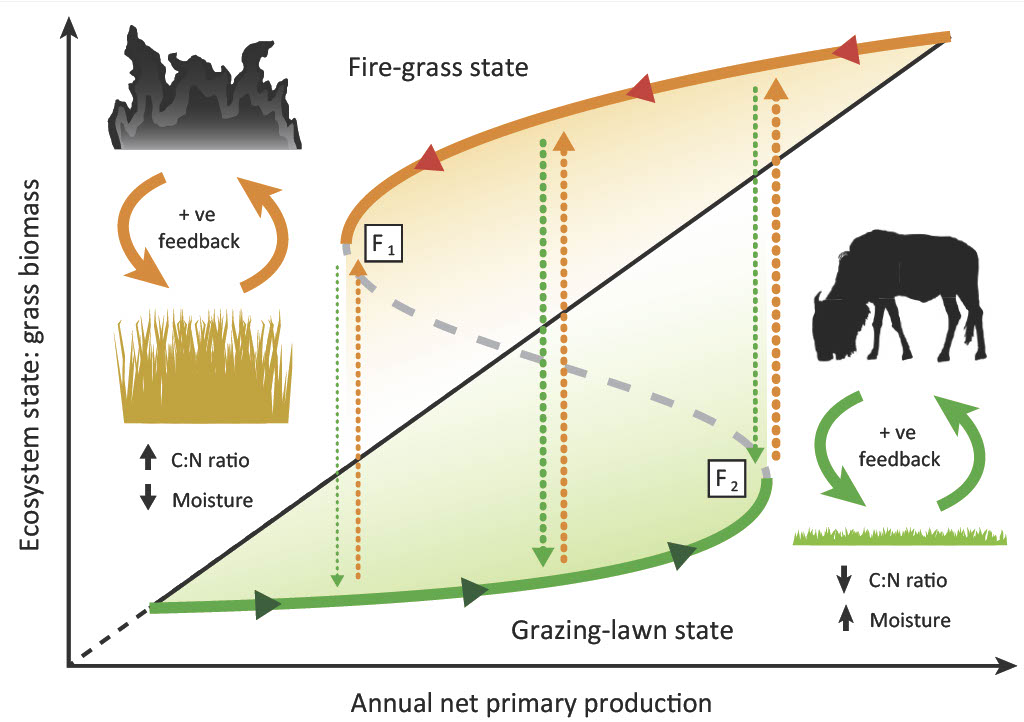Theoretical Ecology
You are here

Theoretical Ecology
Bifurcations in dynamical systems
To be announced
Scope
This first instance of a PhD course on Theoretical Ecology will focus on qualitative changes in dynamics of biological systems that occur when conditions change. Examples of such qualitative changes are when a system changes from being in a constant and stable equilibrium state to exhibiting fluctuations, that is, cyclic dynamics. As another example, even in popular media we may nowadays encounter the term ‘tipping point.’ For example, in the fifth report of the IPCC (the Intergovernmental Panel on Climate Change) a tipping point is defined as an irreversible change in the climate system. These qualitative changes in dynamics occur in many different systems and at many different levels of organization. They are generic phenomena in mathematical models when the value of a particular model parameter changes. These qualitative transitions in dynamics are called bifurcations. The course aims at giving students an understanding about possible phenomena in dynamic models and transitions between different dynamical outcomes, as well as practical training how to apply the theory themselves. The basics are going to be taught while focusing on simple ordinary differential equation (ODE) models. We will then add to it and also discuss the connections to more complex models, such as individual-based models, spatial models or physiologically structured models.
Set-up
The course will start on Monday morning and end on Friday at lunch time. The course is composed of:
1. Introduction lectures
The course starts off on Monday morning with an introductory lecture on the theory and relevance of bifurcation models is explained. Background information will be given in lectures by the course organisers, followed by hands-on application in the computer labs.
2. Computer labs
The computer labs in the afternoons will provide the opportunity of practical training how to apply the theory. Students should bring a laptop with a recent version of R (version 4.0 or higher) and Rstudio installed (the exact version is not so important, just that it is recent).
3. Evening sessions
Evening hours will be filled with presentations about applications in different case studies.
4. Poster carousel
After dinner of the first day of the course there will be a poster carousel during which participants present themselves, their research and interest in the course. The carousel will consist of approx. 5 sessions. Per session approx. 5 participants present their poster (5-10 minutes), followed by 5-10 minutes discussion. Between sessions there is a 5-minute break to switch. Posters will be displayed on the walls of the course venue throughout the course.
5. Key-note/guest lecture
As guest lecturer will give 2 lectures about his/her/they work on spatial interactions in ecosystems, which represent prominent examples of the power of bifurcation theory for understanding the dynamics of real ecosystems.
Lecture notes about bifurcations in biological dynamics: https://staff.fnwi.uva.nl/a.m.deroos/projects/BifurcationTheory/.
Programme (preliminary)
Monday
Topic: Introduction to theory
Evening: Poster carousel
Tuesday
Topic: Basic bifurcation models
Evening: Presentations about applications in different case studies
Wednesday
Topic: Bifurcation models based on spatial systems (by guest lecturer Max Rietkerk)
Evening: Presentations about applications in different case studies
Thursday
Topic: Bifurcations in structured population models
Evening: Presentations about applications in different case studies
Friday
Topic: Bifurcations in individual-based simulation models
Afternoon: Course wrap-up
Speaker (October 2022)
Course organisers
- Prof. dr. André de Roos (Theoretical and Computational Ecology, Institute for Biodiversity and Ecosystem Dynamics, University of Amsterdam)
- Dr. Ben Martin (Theoretical and Computational Ecology, Institute for Biodiversity and Ecosystem Dynamics, University of Amsterdam)
- Jasper Croll (Theoretical and Computational Ecology, Institute for Biodiversity and Ecosystem Dynamics, University of Amsterdam)
- Dr. Claudius van de Vijver (Graduate School PE&RC)
General information
| Target Group | The course is aimed at PhD candidates, postdocs, and other academics |
| Group Size | Min. 20, max. 25 participants |
| Course duration | 5 days |
| Language of instruction | English |
| Frequency of recurrence | Every three years |
| Number of credits | 1.5 ECTS |
| Lecturers | See above |
| Prior knowledge | Basic knowledge of theoretical ecological models is assumed |
| Location | To be determined |
More information
Prof. dr. André de Roos
Email: A.M.deRoos@uva.nl
Dr. Claudius van de Vijver (PE&RC)
Phone: +31 (0) 317 485116
Email: claudius.vandevijver@wur.nl
Registration of interest
At this moment, this course is not scheduled yet. However, if you register your interest in this activity below, we will inform you as soon as the course is scheduled and registration of participation is opened.
